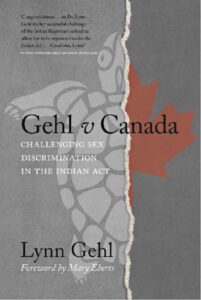Gehl v Canada: Challenging Sex Discrimination in the Indian Act
 VANCOUVER ― A follow-up to Claiming Anishinaabe: Decolonizing the Human Spirit, Gehl v Canada: Challenging Sex Discrimination in the Indian Act is the story of Lynn Gehl’s lifelong journey of survival against the nation-state’s constant genocidal assault against her existence. While Canada set up its colonial powers—including the Supreme Court, House of Commons, Senate Chamber, and the Residences of the Prime Minister and Governor General— on her traditional Algonquin territory, usurping the riches and resources of the land, she was pushed to the margins, exiled to a life of poverty in Toronto’s inner-city.
VANCOUVER ― A follow-up to Claiming Anishinaabe: Decolonizing the Human Spirit, Gehl v Canada: Challenging Sex Discrimination in the Indian Act is the story of Lynn Gehl’s lifelong journey of survival against the nation-state’s constant genocidal assault against her existence. While Canada set up its colonial powers—including the Supreme Court, House of Commons, Senate Chamber, and the Residences of the Prime Minister and Governor General— on her traditional Algonquin territory, usurping the riches and resources of the land, she was pushed to the margins, exiled to a life of poverty in Toronto’s inner-city.
With only beads in her pocket, Gehl spent her entire life fighting back, and now shares an insider analysis of Indian Act litigation, the narrow remedies the court imposes and of obfuscating parliamentary discourse, as well as an important critique of the methodology of legal positivism. Drawing on social identity and Indigenous theories, the author presents the Disenfranchised Spirit Theory, revealing insights into the identity struggles facing Indigenous Peoples to this day.
About Gehl v Canada
― The only full-length first-person account of a leading case about discrimination against women in the Indian Act, the book details Gehl’s 34-year fight with the Canadian government regarding unknown and unstated paternity.
― A clear-eyed assessment of the links between Canada’s Indian Act, unstated paternity policy, and the sexual violence imposed on Indigenous women.
― An unvarnished account of one Indigenous woman’s journey from living in poverty, oppression and disenfranchisement to being an expert for the Senate, the House of Commons, and the Feminist Alliance for International Action.
― At a time when there is widespread condemnation of colonial systems and policies, Gehl offers a solid critique of the methodology of legal positivism through an Indigenous knowledge lens.
Key issues from Gehl v Canada
― Canada has always sought to reduce the number of registered Status Indians living in its colonial territory and therefore reduce its treaty responsibilities to them. The ongoing sex discrimination within the Indian Act created in 1985 was another manifestation of this unspoken cultural genocide.
― The 1857 Gradual Civilization Act stripped women of their Indian Status when they married non-Status men. This prevented them and their children from accessing treaty and community support and removed them from Band membership and First Nationhood as well as physically removing them from their communities.
― In 1985, the Indian Act was updated through Bill C-31 to better align it with the Charter of Rights and Freedoms, specifically where it related to sex discrimination. This update registered Indigenous women who lost entitlement due to marriage with non-Status men.
― However, this 1985 update also created different tiers of “Indian-ness” by granting men 6(1)a status—also known as the stronger form of status—and reinstated women 6(1)c status and their children with 6(2) status—which are weaker forms of status. Thus, sex discrimination continued. In addition, the issue of unknown and unstated paternity was created at this time.
Most of this was resolved in 2019 through Sharon McIvor’s United Nations Human Rights Committee complaint. But the second-generation cut-off rule—a policy by which a child is denied status after two generations of non-Status lineage—continues.
― Indigenous people with 6(1) status can pass status on to their children, regardless of who the other parent is. Indigenous people with 6(2) status can only pass status on to their children if the other parent is also a Status Indian.
― Children born to a 6(2) person and a non-status person are denied status due to what is known as the second-generation cut-off rule.
― Prior to the 1985 update to the Indian Act, children of unstated and unknown fathers were Status Indians like their mothers. However, Bill C-31 became silent on the issue of unknown and unstated paternity. This silence or gap was then filled by an internal Indigenous and Northern Affairs Canada (INAC) policy of assuming non-status paternity. This policy denied thousands of Indigenous people their status rights but has also made it impossible to regain status for those who seek it where paternity cannot be officially proven. This is what Gehl v Canada sought to address.
― The issue of unstated and unknown paternity creates a great deal of hardship for many women. There are many reasons why a woman might not want to or might not be able to obtain the signature of her child’s father on the official long-form birth certificate, including instances of rape, domestic abuse, incest, or premature death. Additionally, there are times when the man will not sign the birth certificate.
― There is some evidence to suggest that official long-form birth records in Ontario have been tampered with to remove paternal information when the mother was not married. In instances where the original information has been removed or concealed, it is worth noting that in such instances where a correction on an official birth document was necessary, the policy was to add a notation rather than remove the information entirely. Yet these names were blacked out or papered over.
LYNN GEHL, PhD, is now a member of Pikwàkanagàn First Nation and a citizen of the Anishinabek Nation. She is the author of The Truth That Wampum Tells: My Debwewin on the Algonquin Land Claims Process and Claiming Anishinaabe: Decolonizing the Human Spirit.


